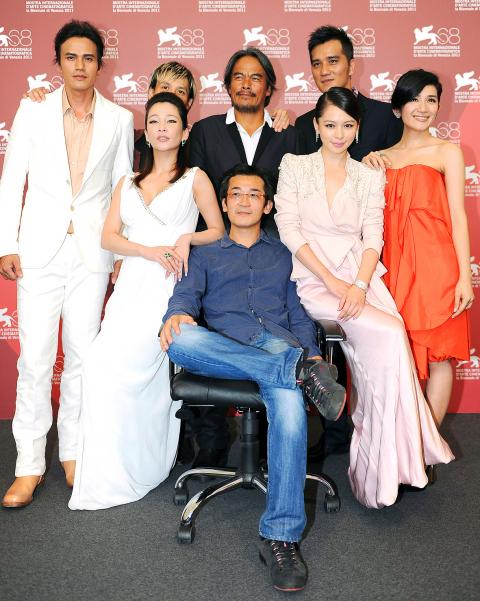The director of the much touted movie Seediq Bale (賽德克巴萊) said on Thursday in Venice that he made the movie not just to promote Taiwan in the international community, but also to bring peace and harmony to all the ethnic groups in the country.
Wei Te-sheng (魏德聖) had in mind the contradictions and conflicts among Taiwan’s different ethnic groups when he met the press to talk about his epic movie at the Venice Film Festival.
He said he hoped that the movie, based on Taiwanese Aborigines’ fight against Japanese colonizers, would increase the world’s understanding of the nation, whose history and culture had been created by the 14 native tribes, as well as Han Chinese immigrants and recent new immigrants from neighboring countries such as Vietnam and the Philippines.

Photo: EPA
The interactions among these ethnic groups created a unique culture in Taiwan, he said, adding that he hoped the film would have a psychological healing effect on Taiwanese.
To dissipate hatred, “you’ve got to return to where it started,” Wei said.
He observed that people in Taiwan had not worked hard enough to learn about the culture of other ethnic groups, often resulting in one group’s “forceful intervention” in the lifestyle of another group or groups.
Every color in a rainbow exists on its own and next to other colors without one interfering with the others, but together they form a beautiful picture, he said.
The film is one of 22 that have been nominated for the Golden Lion award at this year’s Venice Film Festival — one of the world’s most prestigious cinematic competitions.
To accommodate the festival’s screening format, the four-and-a-half-hour film had to be cut to 135 minutes. Wei conceded that a large part of the emotional buildup in the film was sacrificed to allow room for other significant story lines.
After the film’s debut, Wei said he closely observed how the audiences reacted during screenings and kept asking himself whether their applause was because of true appreciation or simply politeness.
The Taiwanese production has been mired in controversy over how it has been labeled. The festival originally listed the film as originating from “China, Taiwan,” but after Taiwan’s representative to Italy protested, the listing was changed to “Chinese Taipei.”
When asked about the issue, Wei said he did not want the public to focus on political questions, but on the greatness of the power of art.
He said one of the most beautiful maps of the world is a satellite image of the Earth because it depicts the wholesome look of the planet. The ugliest map, he said, was one drawn by politicians with lines and blocks.
The power of art is like the satellite image of the Earth, which can remove all differences, Wei said.
“We as artists do not think within those lines. Whoever draws lines on the ground, I will ask them to remove them,” Wei added.
John Woo (吳宇森), the famed Hong Kong director and producer, who was present at the press conference, praised Wei for having produced an epic movie in which all Aboriginal actors had played their roles so sincerely that they made a touching movie.
Woo also commented that Wei’s work had demonstrated a humanitarian spirit, unlike Woo’s own heroes, who are a romantic reflection of his personality.
The film is scheduled to be released in Taiwan tomorrow under the title Warriors of the Rainbow: Seediq Bale (彩虹戰士:賽德克巴萊).

Several Chinese Nationalist Party (KMT) officials including Chairman Eric Chu (朱立倫) are to be summoned for questioning and then transferred to prosecutors for holding an illegal assembly in Taipei last night, the Taipei Police said today. Chu and two others hosted an illegal assembly and are to be requested to explain their actions, the Taipei City Police Department's Zhongzheng (中正) First Precinct said, referring to a protest held after Huang Lu Chin-ju (黃呂錦茹), KMT Taipei's chapter director, and several other KMT staffers were questioned for alleged signature forgery in recall petitions against Democratic Progressive Party (DPP) legislators. Taipei prosecutors had filed

Taiwan would welcome the return of Honduras as a diplomatic ally if its next president decides to make such a move, Minister of Foreign Affairs Lin Chia-lung (林佳龍) said yesterday. “Of course, we would welcome Honduras if they want to restore diplomatic ties with Taiwan after their elections,” Lin said at a meeting of the legislature’s Foreign Affairs and National Defense Committee, when asked to comment on statements made by two of the three Honduran presidential candidates during the presidential campaign in the Central American country. Taiwan is paying close attention to the region as a whole in the wake of a

NEW WORLD: Taiwan is pursuing innovative approaches to international relations through economics, trade and values-based diplomacy, the foreign minister said Taiwan would implement a “three-chain strategy” that promotes democratic values in response to US tariffs, Minister of Foreign Affairs Lin Chia-lung (林佳龍) said. Taiwan would aim to create a “global democratic value chain,” seek to capitalize on its position within the first island chain and promote a “non-red supply chain,” Lin was quoted as saying in the ministry’s written report to the Legislative Yuan submitted ahead of the legislature’s Foreign Affairs and National Defense Committee meeting slated for today. The Ministry would also uphold a spirit of mutual beneficial collaboration, maintaining close communication and consultations with Washington to show that Taiwan-US cooperation

Taiwan and the US have begun trade negotiations over tariffs imposed by US President Donald Trump earlier this month, Minister of Foreign Affairs Lin Chia-lung (林佳龍) said in an interview this morning before reporting to the Legislative Yuan’s Foreign Affairs and National Defense Committee. The Taipei Economic and Cultural Representative Office (TECRO), Taiwan’s de facto embassy in the US, has already established communication channels with the US Department of State and the US Trade Representative (USTR), and is engaging in intensive consultations, he said. Points of negotiation include tariffs, non-tariff trade barriers and issues related to investment, procurement and export controls, he